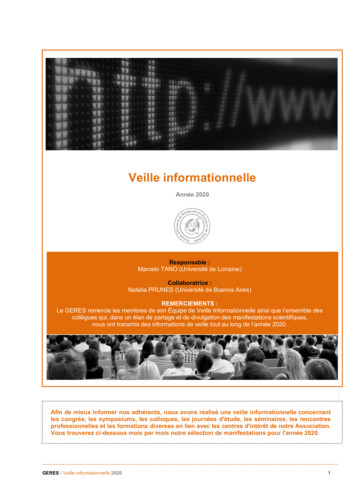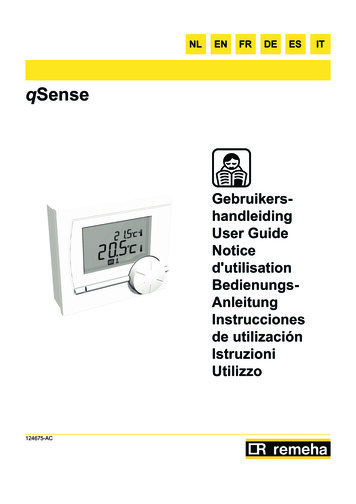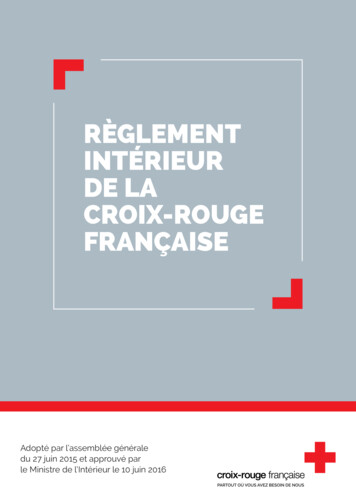
Transcription
Veille de l’IREDU n 133 septembre 20121. Ressources sur le Web . 22. Sommaires de revues en éducation . 423. Livres intéressants . 1021
1. Ressources sur le WebRepéré sur : Amue.frL’IGAENR a réalisé un rapport d’audit des systèmes de gestion et de comptabilité de l’Agence EuropeEducation Formation France (A2E2F). Après une présentation de la méthodologie appliquée auxcontrôles et à l’audit, le rapport traite des objectifs définis par l’agence en 2011, de l’évolution deson organisation fonctionnelle, de sa gestion financière et comptable et du suivi desrecommandations présentées en 2011 par l’IGAENR et par la commission européenne.Christophe Jaggers. Les nouveaux bacheliers inscrits en licence à la rentrée 2011. Note d'information,n 12.07, juillet 2012Repéré sur : cafepedagogique.netFrançois Jarraud. Ile-de-France : Comment réduire les inégalités sociales à l'école ?François Jarraud. Plagiat et copier-coller : Que faire ?François Jarraud. Combien de décrocheurs ?Monique Royer. Individualisation : Le défi de l'accompagnement des équipes pédagogiquesFrançois Jarraud. L'irremplaçable rôle des parentsFrançois Jarraud. L'apprentissage n'est pas une arme efficace contre le chômageFrançois Jarraud. Le socle dans tous ses états. Le socle dans tous ses étatsFrançois Jarraud. Le soutien scolarie renoue avec la croissance.François Jarraud. L'agressivité dans l'enseignementFrançois Jarraud. L'allaitement maternel améliore les compétences cognitives des enfantsRepéré sur : Cereq.frCour des comptes. La politique française d'aide au développement. Paris : La documentationfrançaise, juin 2012. 120 p.2
CARTRON Françoise. Rapport d'information fait au nom de la commission de la culture, del'éducation et de la communication par la mission d'information sur la carte scolaire. Paris : Sénat ;Commission de la culture, de l'éducation et de la communication, juin 2012, 105 p.BLANC Paul, BONDONNEAU Nicolas, CHOISNARD Marie-Françoise. La scolarisation des enfantshandicapés. Paris : Présidence de la République, juin 2011. 64 p.LOARER Christian, SALLÉ Joël, Inspection générale de l'administration de l'éducation nationale et dela recherche. La pratique sportive à l'école primaire. Paris : Ministère de l'éducation nationale, de lajeunesse et de la vie associative : Ministère de l'enseignement supérieur et de la recherche, juin2012. 67 p.BRASSENS Bertrand, TOUSSAIN Remi, LAVAL Didier, MAGANA Jean-François, TRASSOUDAINEFrançoise, BLANCHARD Philippe, MESCLON-RAVAUD Myriam, Inspection générale des finances.Evaluation de la mise en place des DIRECCTE. Paris : Inspection générale des finances : Inspectiongénérale des affaires sociales : Conseil général de l'industrie, de l'énergie et des technologies, mai2012, 312 p.Repéré sur : Ecs.orgWhat States Are DoingCurriculum ModelsIllinois recently enacted legislation calling for the development of middle and high schoolmathematics curriculum models to help teachers implement new math standards. The curriculummodels must include, among other elements, (1) scope-and-sequence descriptions, (2) sample lessonplans, (3) model high school course designs, and (4) teacher and administrator training programs, inboth traditional and electronic formats. The P-20 council is directed to report to the governor andgeneral assembly on district use of the curriculum models, and within four years of enactment of thislegislation, state math test results and postsecondary remediation data must be used to gauge theeffectiveness of high school math instruction.TechnologyLast week, Florida announced that it will be the first state in the nation to make the Microsoft ITAcademy available to middle school students. The program is designed to offer students the skillsnecessary to earn Microsoft Certifications, and provide educators with professional developmentopportunities to help them stay abreast of the latest Microsoft technologies and easily integratethese technologies into their existing curriculum and lesson plans.Online Information SharingThe Georgia Partnership for Excellence in Education has created an online Education Policy Toolbox.This portal can be used by Georgia education stakeholders to find information across a wide varietyof topics from Accountability to Teacher and Leader Workforce Issues. The site also tracks latesteducation news and highlights recent publications.3
Good ReadsEducation LeadersThe Pearson Foundation has launched a new project that aims to share the insights of educationleaders whose daily efforts are improving outcomes for students inside and outside the classroom.Five Things I've Learned chronicles personal lessons learned from decades of real-world experience,sharing proven practice and wisdom about learning, teaching, and helping others. ECS PresidentRoger Sampson is included, along with several ECS Commissioners.Recruitment and RetentionA new report from The Education Trust examines teacher recruitment and retention in hard to staffschools. The authors offer examples of how some schools and districts are making high-poverty, lowperforming schools satisfying, attractive places to work.Teacher PreparationIn this report, the Rennie Center presents a new three-year model for post-baccalaureate teacherpreparation and development aimed at improving the quality of the educator workforce statewide.The model proposed focuses on partnerships at the district level to achieve joint accountability forthe training of a majority of teachers working in the Commonwealth.Title IXThe National Women's Law Center has released a report outlining the implications of education laws,specifically Title IX, on pregnant and parenting students. The authors examine federal, state, andlocal policies, and rank states in terms of how well state education laws and policies address theneeds of these students, and conclude with recommendations for both policymakers and schools.Postsecondary CompletionCheck out Public Agenda's infographic: The Completion Crisis: What Students Have to SayWhat States Are DoingQRISThe Washington Department of Early Learning has launched a statewide initiative to implement aQuality Rating and Improvement System (QRIS) for the state's early childhood education and careprograms. The state launched phase one of "Early Achievers" this month, aimed at reachingapproximately 57% of licensed and certified child care programs in the state. QRIS will beimplemented statewide by July 2013.Veterans AffairsNevada Governor Brian Sandoval has issued an executive order creating the Governor's InteragencyCouncil on Veterans Affairs. The council, which includes a representative of the Nevada System ofHigher Education, is directed to 1) identify and prioritize the needs of the state's veterans, and 2)increase coordination of state government with the efforts of federal and local governments, nonprofit organizations, and other entities.4
Virtual EducationToday, the Louisiana Department of Education released a Request for Application to authorizepartners from industry, higher education, online education, and schools themselves to participate inthe Course Choice program. Selected participants will be eligible to provide a range of publiclyfunded online education options, beginning in the 2013-14 school year. This first Course Choiceselection process will focus on: 1) core academic subject offerings, 2) career and technical offerings(including internships and apprenticeships), and 3) college credit course offerings.Good ReadsPostsecondary CompletionThe National Center for Education Statistics (NCES) has released a report summarizing nationalpostsecondary statistics including price of attendance, enrollment, and degrees conferred.Science AchievementA new report from Best Evidence Encyclopedia summarizes evidence on three types of programsdesigned to improve the science achievement of students in grades K-6. The authors conclude thatimproving outcomes in elementary science depends on improving teachers' skills in presentinglessons, engaging and motivating students, and integrating science and reading. See also theEducator's Summary.Emerging TechnologiesThe latest Horizon Report from the New Media Consortium (NMC) examines emerging technologiesand their potential impact on and use in teaching, learning, and creative inquiry within theenvironment of pre-college education.Teacher OpinionsA new report from Education Sector examines changes in teacher opinion from 2007 to 2011 about avariety of teacher-centered reforms, including new approaches to evaluation, pay and tenure, andthe role of unions in pushing for or against these reforms. The findings show strong continuedsupport among teachers for unions, who are more likely today to say they want unions to help withand even lead reforms.What States Are DoingPostsecondary SuccessFlorida's new Smart College Choices web portal, just launched by the Florida Department ofEducation, allows prospective and current students to view graduation rates, employment statistic,sand earnings data for graduates of the 28 Florida College System institutions and Florida PublicSchool District Career Centers.Workforce DevelopmentEarlier this summer, the Georgia Department of Education launched the Georgia InternationalWorkforce Development Initiative (GWI), a multi-agency effort to promote job growth ininternational businesses with existing Georgia operations. The initiative will build upon thedepartment's recent work to define educational pathways, which include training in foreign5
language, cultural awareness, and sought-after business and technical skills. Through use of trainingmaterials of international businesses located in the state, Georgia students will be able to achievecritical job certifications needed to fill new or existing job openings with participating businesses.More about the initiative in this two-page fact sheet.AutismMichigan Governor Rick Snyder recently issued an executive order creating the Autism Council toreview, adopt, and implement the Michigan Autism Spectrum Disorder (ASD) State Plan. As noted ina press release, the plan will provide for comprehensive, lifespan supports to individuals with ASDand their families through access to information and resources, coordination of service,s andimplementation of evidence-based practices.Charter SchoolsClick here to read up on recent state policy changes regarding charter schools.Good ReadsARRAThis report from the Center on Education Policy (CEP) examines the impact education stimulus fundshave had on states and school districts. The report synthesizes findings across six reports publishedby CEP from December 2009 to February 2012, and distills themes and conclusions based on aretrospective look at the effects of ARRA on K-12 education.Teacher EvaluationThisreport from the Tennessee Department of Education examines first year findings from the state'sstudent outcomes-based, statewide educator evaluation system. Researchers found that studentachievement improved in the first year of implementation (2011-12), with test scores improving at afaster rate than any previously measured year.21st Century SkillsThis Report Brief from the National Research Council defines and discusses the importance of 21stcentury skills. The authors also outline teaching for deeper learning and recommendations forpolicymakers to support students' acquisition of transferable knowledge and skills.Dual EnrollmentThe James Irvine Foundation has released a report outlining recommendations for policymakers onhow to use dual enrollment programs to enhance college and career pathways for low-income youth.From a study of 3,000 students across California, researchers found that career-focused dualenrollment programs can provide important benefits for those who are underachieving andunderrepresented in higher education.Postsecondary Education: Immigrant and Second Generation StudentsThis Statistics in Brief describes the characteristics and undergraduate experiences of 2007-08undergraduates who immigrated to the United States or who had at least one immigrant parent6
(second-generation Americans). The authors found that nationally about 23% of all undergraduateswere immigrants (10%) or second-generation Americans (with an immigrant parent) (13%).What States Are DoingCompetency-Based ProgressionIowa's Competency-Based Instruction Task Force, established by Senate File 2284, will studycompetency-based instruction standards and the integration of competency-based instruction withthe Iowa Core. The Task Force will also develop assessment models and professional developmentfor educators.Career-ReadinessEarlier this summer, South Dakota's Departments of Education and Labor and Regulation announcedthat high school juniors and seniors are invited to participate in the ACT National Career ReadinessCertificate (NCRC) program during the 2012-13 school year. The NCRC is an industry-recognized,portable credential that certifies essential skills needed for workplace success. To earn certification,students must attain at least the lowest certification level on three ACT WorkKeys assessments:Applied Mathematics, Reading for Information, and Locating Information.Education ReformMaine Governor Paul LePage and Education Commissioner Stephen Bowen set a new educationagenda for the state after a report from Harvard ranked Maine 40th of 41 participating states interms of growth in student performance. The ABC plan focuses on Accountability, Best practices, andChoice, and is intended to create a system that measures performance and provides assistance tostruggling schools, take cues from other systems that have yielded proven results, and gives studentsmore learning options.Postsecondary Financial AidClick here to read up on recent state policy changes regarding postsecondary financial aid.Good ReadsP-3 DataThe Annie E. Casey Foundation has released the 2012 edition of their Kids Count annual report,measuring states' commitment to children and youth in four areas: education, economic well-being,family and community, and health. Among other findings, the authors find that 53% of 3- and 4-yearolds did not participate in preschool in 2008-10.International ComparisonsHarvard University's Program on Education Policy and Governance (PEPG) has released a reportanalyzing growth trends of student performance in math, reading, and science across 49 countriesand 41 U.S. states. Among other findings, the authors purport that spending more on educationmade little difference in student achievement results: Florida, Colorado, and North Carolinaincreased their spending by less than the national average and all showed increases in studentachievement above the national average.7
Urban SchoolsA new study from The New Teacher Project (TNTP) finds that urban schools are systematicallyneglecting their best teachers, while they keep many of their lowest-performing teachers. The studyexamines causes contributing to these retention patterns and offers recommendations for improvingteacher quality in urban schools. See also a summary of the report, the executive summary, and tipsfor principals.New From ECSP-3: Reading/LiteracyThis paper from ECS outlines state policies relating to 3rd-grade reading proficiency, includingidentification of, intervention for, and retention of struggling readers in the P-3 grades. The paperprovides a state-by-state policy summary, sample statutory language, and highlights from billsenacted this year.What States Are DoingK-8 Language ImmersionMore than 340 Delaware kindergarteners this fall will begin studying either Mandarin Chinese orSpanish in an elementary immersion program and be able to continue that study into middle school,thanks to the launch of the Governor's World Language Expansion Initiative. By the year 2020, thestate hopes to see nearly 8,000 K-8 students in 20 immersion programs.Common Core Teacher TrainingThe Florida College System Teacher Educator Programs are the first in the nation to voluntarilycommit to a system-wide implementation of the Common Core State Standards. The new standardswill be embedded in the teacher preparation program curriculum throughout the college system sonew teachers who enter the classroom will be ready for the more rigorous standards.Teacher Performance-Based CompensationMississippi Governor Phil Bryant has unveiled a plan to encourage increased teacher effectivenessthrough a performance based compensation system. Governor Bryant cites a new report thatoutlines flexible, accountable tactics districts can use to encourage and reward effective teachers intheir districts.Career/Technical EducationLast week, Missouri Governor Jay Nixon announced nearly 9 million in grants to establishInnovation Campuses throughout the state to train students for career opportunities in high-demandfields, cut the time it takes to earn a college degree, and reduce student debt.Good ReadsNCLBThe Center for America Progress has released a report outlining takeaways from the 27 second roundNCLB waiver applications. The authors found that states have proposed interesting and promising8
ideas in each of four principle areas: college- and career-ready standards, differentiatedaccountability systems, supporting effective instruction and leadership, and reducing duplication andadministrative burden. Very few states, however, have detailed plans for reducing duplication andadministrative burden.KindergartenThe National Center for Education Statistics (NCES) released findings from a longitudinal study ofkindergarteners attending public and private schools in the U.S. The authors found that 25% ofkindergarteners lived in households below the poverty line.FinanceA recent report from The Thomas B. Fordham Institute examines how voters think educationspending should be reduced in tough budgetary times, and what programs should be protected. Theauthors found that 74% of respondents support performance-based layoffs, and 48% think the bestsolution to a severe budget deficit in their district would be to "cut costs by dramatically changinghow it does business."AccountabilityThis report from Education Sector details the path one state, California, has taken in building itscurrent student data and accountability system. The author argues that argues that California andmany other states have the foundations in place to build better accountability systems - systems thatfocus on meaningful school improvement; they just need to put the pieces together in the right way.What States Are DoingForeign LanguagesNew York legislation enacted July 31 establishes the state seal of biliteracy to recognize high schoolgraduates who have attained a high level of proficiency in one or more languages in addition toEnglish. With this legislation, New York becomes the second state (after California) to establish astate-approved endorsement to the high school diploma demonstrating a graduate's biliteracy.Schools as Community HubsIn Michigan, a comprehensive neighborhood revitalization pilot centered on making select Detroitpublic schools the hub of the community was launched earlier this month. The program, to be pilotedin a 10-block radius of the Morningside neighborhood, will expand to cover eight additionalsurrounding neighborhoods served by Detroit Public schools. Housing rehabilitation, blight removal,cleanup and beautification, placement of social workers in schools, demolition of dangerousbuildings, lighting, recreation, and maintaining safe routes to schools are among the work that will bedone. Five state agencies, the City of Detroit, the Wayne County Treasurer's Office, volunteer andnonprofit groups, neighborhood associations, corporate and private partners, and Detroit PublicSchools are collaborating on this project.STEMTennessee recently announced the opening of three new STEM-focused schools this year. The new9
programs are part of the Tennessee STEM Innovation Network, a collaboration between theTennessee Department of Education and the Battelle Memorial Institute.Graduation RequirementsClick here to check out recent state policy changes regarding high school graduation requirements.Good ReadsAdult College CompletionThe Western Interstate Commission for Higher Education (WICHE) has been leading a LuminaFoundation funded effort called The Adult College Completion Network for nearly two years. Toshare some of the initial ideas learned from this project, WICHE has released a report focusing onadult college completion strategies and tools being employed by diverse efforts across the country.AttendanceThis report from the Center for Evaluation and Education Policy (CEEP) examines the effects ofchronic absenteeism on student achievement in Indiana. The report has implications for all states, asattendance data in Indiana reflects national trends, and illustrates that missing school matters forfuture academic achievement.High Poverty SchoolsA new report from the PEW Research Center examines income segregation by Metropolitan area andhow it has changed from 1980 to 2010. The report's finding that housing segregation has increasedhas implications for growth/decline in the number of high poverty schools.What States Are DoingTechnologyLast week, California's Education Technology Task Force, appointed by State Superintendent of PublicInstruction Tom Torlakson, issued recommendations that Torlakson will consider in working towardan updated Education Technology Plan.Early Childhood AssessmentIowa's Task Force on Early Childhood Assessment, created as part of S.F. 2284, is charged withselecting a standard kindergarten readiness assessment that school districts will be required toadminister. A recommendation is due to the legislature by November 15, 2012.Special EducationClick here to check out recent state policy changes regarding special education.Good ReadsSchool LeadershipThis research brief from the RAND Corporation outlines key findings from the Pittsburgh PrincipalIncentive Program (PPIP). PPIP provides support, assistance, and performance-based evaluations and10
financial awards to principals tied to measures of leadership practices and student achievementgrowth. The authors found that the program changed principal behavior in ways aligned withprogram goals, and that student achievement growth exceeded that of the rest of the state in threeout of four years since the beginning of the program, including increases in achievement growth forlow-achieving students.K-6 LiteracyThe What Works Clearinghouse at the Institute of Education Sciences (IES) outlines the Open CourtReading program in this report. Open Court Reading is a core reading program for grades K-6designed to teach decoding, comprehension, inquiry, and writing in a logical progression. The reportincludes research and summary findings on the program, and shows evidence of a positive effect oncomprehension.RetentionA new brief from the Center on Children and Families at Brookings examines the issue of graderetention in the early grades, with an eye toward 3rd-grade reading proficiency. The authorsummarizes existing research and presents policy implications. Click here to view the archivedwebcast from the August 16th panel discussion on the topic, featuring ECS Early Learning ProjectManager Karen Schimke.What States Are DoingCharter School TransparencyLast week, the Texas Education Agency announced that charter applications for schools launchedsince 2001 are now available for public review on the agency's website. Beginning with the 2011 poolof charter school applications, any submitted charter application, whether the entity was granted acharter by the State Board of Education or not, is posted.Common Core State Standards and AssessmentsNew York legislation signed into law on August 17 authorizes boards of cooperative educationalservices (BOCES) to enter into contracts of up to two years with out-of-state districts for specifiedservices, including for the use of existing products that demonstrate how to map the Common CoreState Standards (CCSS) to assessments and/or to provide access to existing webinars or onlinecourses relating to implementing the CCSS.Data DashboardThe Delaware Department of Education's Education Insight system, funded with a Race to the Topgrant, provides web-based dashboards that aggregate data from existing sources to show acomprehensive view of student information. The dashboards allow educators to access timely andactionable information on all students to help manage academic performance and anticipate issuesthat could arise throughout the year.Common CoreClick here to check out recent state policy changes related to Common Core State Standardsimplementation.11
Good ReadsOpinionsThis new PDK/Gallup Poll presents the results from the 44th annual survey of the public's attitudestoward public schools. Among other relevant findings, the poll shows that Americans are divided onwhether teachers should be evaluated based on students' standardized test scores and on whichpolitical party and which presidential candidate can more positively influence public education inAmerica.LeadershipThis report from RAND Corporation examines implementation and outcomes of the Pittsburgh UrbanLeadership System for Excellence (PULSE), a set of reforms designed to improve the quality of schoolleadership throughout the district. The authors look at data from 2007-11, with a focus onunderstanding how principals and other school staff have responded to the reforms, and ondocumenting the student achievement outcomes that accompanied program implementation.Hispanic College EnrollmentThe Pew Hispanic Center reports on increases in the share of Hispanic P-12 and college students. Theauthors found that the number of 18- to 24-year-old Hispanics enrolled in college exceeded twomillion in 2011 and reached a record 16.5% share of all college enrollments.VouchersThis report from the Brookings Institution examined college-going behavior of students whoparticipated in a voucher experiment as elementary school students in New York City in the 1990s.The authors found no overall impacts on college enrollment but did find large, statistically significantpositive impacts on the college going of African-American students who participated in the study. Seealso this archived webcast discussing the findings.Repéré sur : Education.gouv.frLes pratiques éducatives et pédagogiques en dispositif relais. Note d'information, N 12.14, juillet2012Les évaluations en lecture dans le cadre de la Journée défense et citoyenneté. Note d'information,n 12.13, juillet 2012Résultats provisoires du baccalauréat. Note d'information, n 12.12, juillet 2012Les bacheliers S : des poursuites d'études de plus en plus dispersées. Note d'information, n 12.10,Août 2012Nicolas Le Ru. Un déficit d'effort de recherche des entreprises françaises ? Comparaison France –Allemagne. Note d'information Enseignement supérieur et recherche, n 12.09, juillet 201212
Repères et références statistiques sur les enseignements, la formation et la recherche : édition 2012.Paris : Ministère de l’éducation nationale, Ministère de l’enseignement supérieur et de la rechercheRepéré sur : Esen.education.frInspection générale de l'éducation nationale. Rénovation de la voie professionnelle : la certificationintermédiaire. Paris : Inspection générale de l'éducation nationale, mai 2012Le rapport est organisé en trois parties. Une première partie dresse un bilan du diplômeintermédiaire et évalue sa pertinence. La deuxième partie évalue l'efficacité et la qualité duprocessus de certification notamment la qualification en langues vivantes. La troisième partie estconsacrée aux conclusions et aux propositions afférentes qui portent sur le diplôme intermédiaire etsur le processus de certification associé.Jean-Ribert PITTE. Rapport remis au Premier Ministre sur l’activité et les propositions de laDélégation à l’Information et à l’Orientation en 2011-2012.Paris : Orientation pour tous, Juin 2012Ce rapport traite des différents volets de l'activité de la DIO au cours de l'année 2011-2012 : la miseen œuvre du service dématérialisé de l'information et de l'orientation sur les formations et surl'emploi, la géographie des territoires labellisés "orientation pour tous", la participation à la réflexionsur l'orientation dans l'enseignement secondaire et supérieur, la lutte contre le décrochage scolaireet universitaire, la coopération européenne, la promotion de la formation tout au long de la vie. Cedocument s'achève sur une note prospective consacrée à l'évaluation du Service Public del'Orientation.Claire-Lise CAMPION et Isabelle DEBRÉ (Sénat). Loi Handicap : des avancées réelles, une applicationencore insuffisante. Paris : Sénat, juillet 2012Ce rapport fait le bilan de la mise en œuvre de la loi du 11 février 2005. La commission sénatoriale asouhaité savoir dans quelle mesure l'énoncé de droits-créances s'est traduit ou non par la mise enœuvre de droits effectifs. L'étude porte, entre autres, sur les conditions de scolarisation des élèveshandicapés.Monique SASSIER, médiatrice de l'éducation nationale. Rapport 2011 du médiateur de l'éducationnationale et de l'enseignement supérieur. Paris : Ministère de l’éducation nationale, juin 2012Le rapport constate la multiplication des litiges en nombre. La médiatrice est saisie, de plus en plus,de questions tenant à ce qui se passe au quotidien dans les classes (discipline, sanctions,harcèlement entre élèves, enseignants non remplacés.) et observe l'expression de la souffrance autravail des enseignants.Marc Demeuse, Nathanaël Friant. Évaluer les politiques d'éducation prioritaire en Europe: un défiméthodologique. Revue Suisse des Sciences de l'Éducation, n 34-1, juillet 2012, p. 39-55"L'évaluation des politiques éducatives n'est pas une entreprise aisée,
report, the Rennie Center presents a new three-year model for post-baccalaureate teacher preparation and development aimed at improving the quality of the educator workforce statewide. The model proposed focuses on partnerships at the district level to achieve joint accountability for







